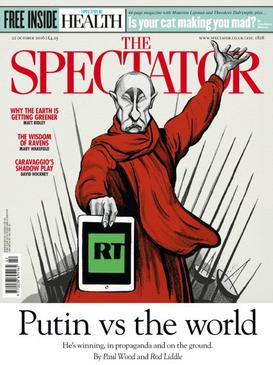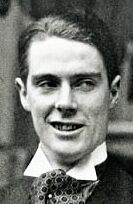Related Research Articles

The recorded history of Scotland begins with the arrival of the Roman Empire in the 1st century, when the province of Britannia reached as far north as the Antonine Wall. North of this was Caledonia, inhabited by the Picti, whose uprisings forced Rome's legions back to Hadrian's Wall. As Rome finally withdrew from Britain, a Gaelic tribe from Ireland called the Scoti began colonising Western Scotland and Wales. Before Roman times, prehistoric Scotland entered the Neolithic Era about 4000 BC, the Bronze Age about 2000 BC, and the Iron Age around 700 BC.

The Spectator is a weekly British news magazine focusing on politics, culture, and current affairs. It was first published in July 1828, making it the oldest surviving weekly magazine in the world. The Spectator is politically conservative, and its principal subject areas are politics and culture. Alongside columns and features on current affairs, the magazine also contains arts pages on books, music, opera, film, and TV reviews. In 2021, it had an average circulation of 102,212.

In the United Kingdom, the Edwardian era was a period in the early 20th century, that spanned the reign of Edward VII from 1901 to 1910. It is commonly extended to the start of the First World War in 1914, during the early reign of King George V.

Anthony Dymoke Powell was an English novelist best known for his 12-volume work A Dance to the Music of Time, published between 1951 and 1975. It is on the list of longest novels in English.

Peter Jonathan Hitchens is an English conservative author, broadcaster, journalist, and commentator. He writes for The Mail on Sunday and was a foreign correspondent reporting from both Moscow and Washington, D.C. Peter Hitchens has contributed to The Spectator, The American Conservative, The Guardian, First Things, Prospect, and the New Statesman. His books include The Abolition of Britain, The Rage Against God, The War We Never Fought and The Phoney Victory.

Mary Louisa "Polly" Toynbee is a British journalist and writer. She has been a columnist for The Guardian newspaper since 1998.

Sir Roger Vernon Scruton, was an English philosopher, writer, and social critic who specialised in aesthetics and political philosophy, particularly in the furtherance of traditionalist conservative views.
Christopher John Penrice Booker was an English journalist and author. He was a founder and first editor of the satirical magazine Private Eye in 1961. From 1990 onward he was a columnist for The Sunday Telegraph. In 2009, he published The Real Global Warming Disaster. He also disputed the link between passive smoking and cancer, and the dangers posed by asbestos. In his Sunday Telegraph section he frequently commented on the UK Family Courts and Social Services.

Anthony Malcolm Daniels, also known by the pen name Theodore Dalrymple, is a conservative English cultural critic, prison physician and psychiatrist. He worked in a number of Sub-Saharan African countries as well as in the East End of London. Before his retirement in 2005, he worked in City Hospital, Birmingham and Winson Green Prison in inner-city Birmingham, England.
Michael John Heath is a British strip cartoonist and illustrator. He has been cartoon editor of The Spectator since 1991.
Maurice John Cowling was a British historian. A fellow of Peterhouse, Cambridge, for most of his career, Cowling was a leading conservative exponent of the 'high politics' approach to political history.
Simon James Heffer is an English historian, journalist, author and political commentator. He has published several biographies and a series of books on the social history of Great Britain from the mid-nineteenth century until the end of the First World War. He was appointed professorial research fellow at the University of Buckingham in 2017.

Peter Brereton Townsend was a British sociologist. The last position he held was Professor of International Social Policy at the London School of Economics. He was also Emeritus Professor of Social Policy in the University of Bristol, and was one of the co-founders of the University of Essex. He wrote widely on the economics of poverty and was co-founder of the Child Poverty Action Group. The Peter Townsend Policy Press Prize was established by the British Academy in his memory.
Sentimentality originally indicated the reliance on feelings as a guide to truth, but in current usage the term commonly connotes a reliance on shallow, uncomplicated emotions at the expense of reason.
The Social Affairs Unit is a right-leaning think tank in the United Kingdom. Founded in 1980 as an offshoot of the Institute of Economic Affairs, it publishes books on a variety of social issues. Its website notes that "many SAU supporters are inclined to believe that the generation which fought the Second World War were rather too keen on social engineering over the goals of personal responsibility".

Sir Michael Gideon Marmot is Professor of Epidemiology and Public Health at University College London. He is currently the Director of The UCL Institute of Health Equity. Marmot has led research groups on health inequalities for over thirty years, working for various international and governmental bodies. In 2023, he was elected to the American Philosophical Society.
Dominic Green is a British historian, columnist and musician. A Fellow of the Royal Historical Society and the Royal Society of Arts, he is editor of the US edition of The Spectator and a commissioning editor of The Critic. He is a columnist and film reviewer for The Spectator, and a columnist for The Daily Telegraph. He also writes frequently on books and arts for The Wall Street Journal, The New Criterion, The Spectator (UK), Standpoint, The Literary Review, and The Oldie. He has also written for The Atlantic, Commentary, The Economist, First Things, The Weekly Standard, CapX and the antiquities magazine Minerva.

Linda Jane Pauline Woodhead is a British sociologist of religion and scholar of religious studies at King's College London Faculty of Arts and Humanities. She is best known for her work on religious change since the 1980s, and for initiating public debates about faith. She has been described by Matthew Taylor, head of the Royal Society of Arts, as "one of the world's leading experts on religion".
Peter Stanley is a prominent Australian military historian, who specialises in the military-social experience of war in the late nineteenth and first half of the twentieth centuries. In a career spanning over three decades, Stanley has worked as an Historian and later Head of the Military History Section at the Australian War Memorial (1980–2007), Head of the Centre for Historical Research at the National Museum of Australia (2007–13) and, since 2013, as Research Professor at the University of New South Wales in the Australian Centre for the Study of Armed Conflict and Society. Starting in 1977—and as at 2019—Stanley has written 27 books and edited eight others, published two novels and co-authored a booklet, and composed at least 46 chapters in books and anthologies, 59 journal articles, seven encyclopaedia entries and numerous papers. In 2011, his book Bad Characters: Sex, Crime, Mutiny, Murder and the Australian Imperial Force (2010) was the joint winner of the Prime Minister's Prize for Australian History.
This is a list of books in the series Studies in the Social History of Medicine. The series was produced by the Society for the Social History of Medicine and Tavistock, later Routledge, between 1989 and 2009. It totalled 37 volumes.
References
- ↑ "Weekend birthdays", The Guardian , p. 58, 24 May 2014
- ↑ Digby Anderson, Social Affairs Unit Why oldies should be amused and amusing 24 February 2005; Accessed 2 May 2008
- ↑ "Digby Anderson". The Guardian. Retrieved 28 August 2015.